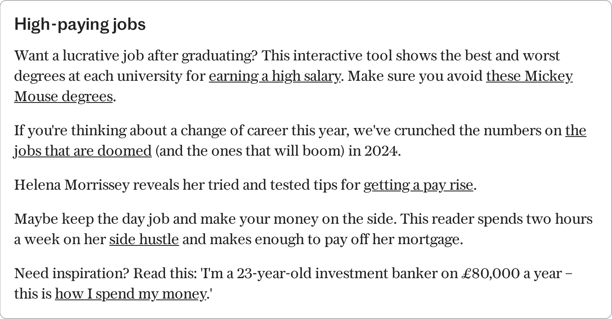Fewer young people would subscribe to ‘generation sick note’ if we gave them something to work for

young people at work© Provided by The Telegraph
Actress Jodie Foster describes working with young people as “really annoying…They’re like: ‘Nah, I’m not feeling it today, I’m gonna come in at 10.30am.’” Gen Z certainly has a reputation for not complying with ‘normal’ working practices, taking random days off, working hours that suit them and prioritising their mental health over work.
It’s an issue that’s been making headlines recently after a report found a higher proportion of people in their early 20s are economically inactive due to health reasons. It said 6pc of younger people have been signed off work, more than in any other age group below the late 40s, and a rise in mental health issues seems to be the main factor behind the figures.
My own experience is mixed – I work with at least as many highly focused, career-minded young people as those who struggle to turn up. But some behaviour is perplexing. I recently organised a filmed discussion to explore different stages in women’s careers; having lined up speakers for each of the key milestones, including a CEO, I checked in with everyone the day before the in-person recording. But the youngest failed to show up and did not respond to phone calls or WhatsApp messages.
I spent the day trying to check she was okay – to no avail. No one else seemed to think it was anything out of the ordinary – even her company seemed relaxed, although she had been expected in the office. I continued to worry until someone let me know that she was back at work the next day, no explanation given or apparently needed for being AWOL for 24 hours.
But the odd no-show doesn’t justify labelling an entire generation “snowflakes”. Is much of the criticism actually just a classic case of older people despairing of the “youth of today”, forgetting how lazy or unmotivated we might have been at the same age?
I went in search of evidence. Here in Britain, we haven’t collected historic information on young people’s attitudes to work, but in America an ongoing study called Monitoring the Future has been surveying 12th graders (18-year-olds) since 1976, with the data available right up to 2022. In short, it’s a study of work ethic right the way through from Boomers (born between 1946 and 1964) to Gen Z (mid-1990s to 2010s).
Jean M Twenge, a psychologist and author of Substack account “Generation Tech”, interrogated the data to see whether today’s young people really are less willing to work than previous generations.
It seems Gen Z has been somewhat maligned. After declining from Boomers to Millennials, work ethic actually made a comeback among Gen Z 18-year-olds in the 2010s, on every measure. So, for example, an increasing number said they wanted to do their best in their job, “Even if this means sometimes working overtime”. This peaked at 54pc of 18-year-olds willing to do overtime in 2020.
But then, in the midst of the pandemic, the numbers collapsed, with the 2022 report suggesting just 36pc would do so – a record low in the survey’s near-half century.
A similar pattern is repeated across the whole survey. One question explores 18-year-olds’ intrinsic motivation to work: “If you were to get enough money to live as comfortably as you’d like for the rest of your life, would you want to work?”. Again, the data reveals a decline in those wanting to work between Boomers and Millennials, a bounce back from Gen Z, before sharply falling in 2021 and 2022 to another all-time low.
It’s the exact same story for those “expecting work to be a very central part of my life” and “expecting my future work to be satisfying”. All the latest readings suggest a dramatic drop in enthusiasm and commitment to work since 2020.
But to what extent does this apply only to teenagers? On this, Britain does have useful – if depressing – data, with a sharp increase in numbers of “economically inactive” adults of all ages since the start of the pandemic. More than nine million Britons aged 16-64 are now economically inactive – over 20pc of the working population. More than two-thirds of the inactive are not signed off long-term sick. So yes, the younger generation may have a (recent) work ethic problem, but so do many of the rest of us.
The fact is that the true psychological impact of lockdowns (and all the associated second order effects) is still barely understood. And while that applies to all age groups, since the young missed out so much – and are the future – it’s critical to focus on them and their recovery.
As the mother of nine (four home-schooled, three at “home university” during lockdowns) my experience isn’t quite statistically significant, but add in my children’s friends and those I meet giving talks at schools and universities and it gives a pretty good indication. Happily, some young people have rebounded, delighted to be out and about in the world again and more appreciative of their opportunities and freedoms. They are seizing the day.
But many others are understandably wary of the system that let them down during crucial years in their teenage lives. They are less than enthused about the idea of throwing themselves wholeheartedly into one job, one company or one career. Or frankly, any job!
More than anything, they want to be in control of their own destiny. “Quiet quitting” – not actually quitting but doing the bare minimum, setting boundaries, not checking emails constantly, saying “no” to extra work – is not just a trend on TikTok. “Coasting” is now a fashionable lifestyle choice.
Much has been said about the diminishing chances of young people being able to buy a home, or afford childcare; I think the loss of motivation is even more fundamental. The relentless onslaught of negativity – from climate crisis to World War Three – inevitably creates a sense of ‘what’s the point?’ Many feel they have lost the chance even to dream.
That’s what we need to help them with first. And empathy is far more likely to help unblock a lack of motivation than exasperation. And we certainly shouldn’t wait for “government” to fix this – obviously it can’t, just as it can’t fix most things at this point.
Instead, whether we are parents or managers, we should mentor and encourage and help unmotivated young people see that even with all today’s big challenges, they can create exciting prospects for themselves. An optimistic future starts with helping young people regain their happiness and sense of purpose.

I overcame imposter syndrome as a chief executive – here’s how you can do the same© Provided by The Telegraph
文章来源:爱尔兰独立报
TKFFF公众号
扫码关注领【TK运营地图】

TKFFF合作,请扫码联系!







 闽公网安备35021102002035号
闽公网安备35021102002035号